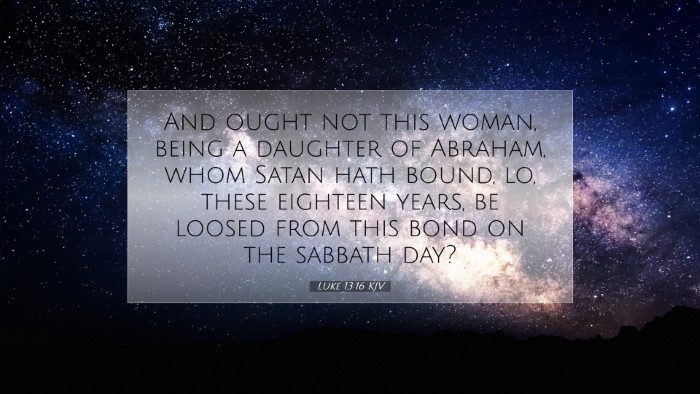Commentary on Luke 13:16
Verse: "And ought not this woman, being a daughter of Abraham, whom Satan hath bound, lo, these eighteen years, be loosed from this bond on the sabbath day?"
Introduction
This verse, part of a larger narrative where Jesus heals a woman on the Sabbath, illustrates key themes in the ministry of Jesus, including compassion, the priority of human need over rigid legalism, and the challenge to traditional religious practices. The verse also serves as a critical reflection on the nature of bondage and freedom, both physical and spiritual.
Historical Context
In first-century Judea, the Sabbath was of immense importance, seen as a day of rest ordained by God. The Jewish leaders imposed strict regulations surrounding Sabbath observance, often to the detriment of mercy and compassion. Jesus' act of healing on the Sabbath raised significant questions regarding these legalistic interpretations of the Law. Understanding this context is essential for grasping the depth of Christ's proclamation regarding the true meaning of the Sabbath.
Exegesis and Analysis
Being a Daughter of Abraham
Jesus refers to the woman as a "daughter of Abraham," emphasizing her rightful place in God's covenant community. As Matthew Henry notes, this title not only signifies her physical descent but also her spiritual heritage. She is deserving of God's attention and care, reflecting the principle that all who are part of God's kingdom have access to His mercy, irrespective of legalistic barriers.
The Bondage of Eighteen Years
The reference to the woman being bound for eighteen years underscores both the severity of her affliction and the prolonged nature of her suffering. Albert Barnes explains that this period signifies a long-standing oppression, likely exacerbated by societal and religious neglect. This detail evokes a sense of compassion for the woman, highlighting the harshness of her condition within the context of strict Sabbath laws.
Loosed from this Bond on the Sabbath Day
Jesus challenges the perception of the Sabbath by asking whether it is appropriate for the woman to be freed on this day of rest. Adam Clarke emphasizes that Jesus’ question serves to redirect the focus from rules to redemption. He asserts that acts of mercy and compassion should take precedence over ritual observance, as the spirit of the law aims to bring life rather than restrict it.
Theological Implications
Jesus’ Authority over Religious Tradition
Jesus’ actions and words assert His authority to reinterpret Jewish law in the light of compassion and mercy. This act symbolizes the new covenant, where the grace of God through Christ fulfills and transcends the old law. Matthew Henry notes that the authority of Christ challenges existing paradigms and positions Him as the embodiment of grace who prioritizes human need.
Bondage and Liberation
The verse speaks to broader themes of bondage—both physical and spiritual. Jesus’ use of the phrase “whom Satan hath bound” indicates a spiritual dimension to her ailment. Albert Barnes argues that this reflects the reality of spiritual warfare, wherein the enemy binds individuals in various ways. The liberation of the woman is emblematic of the freedom offered to all believers through Christ, who came to set the captives free.
The Nature of the Sabbath
The Sabbath is redefined by Jesus from a day of mere rest to a day of active compassion. Adam Clarke points out that when the Sabbath is observed as envisioned by God, it should be a day of joy and healing. Thus, Jesus’ healing action can be seen as a restoration of the Sabbath to its intended purpose—a day for celebrating God's goodness and grace.
Practical Applications
- Prioritizing Compassion: As this scripture illustrates, compassion should reign over legalistic rigidity. Pastors and theologians must encourage an understanding of grace that empowers believers to act kindly and lovingly, even when it challenges established norms.
- Recognizing Spiritual Bondage: This passage serves as a reminder of spiritual warfare and the forms of bondage that individuals may face. Church leaders should be vigilant in offering support and deliverance to those who are spiritually bound.
- Embracing the True Meaning of Worship: Worship, including Sabbath observance, should focus on honoring God through acts of mercy, service, and love. This approach enriches the experience of community and strengthens faith.
Conclusion
Luke 13:16 not only showcases a miracle of healing but also a profound teaching moment on the nature of the Sabbath, religious authority, and divine compassion. The insights drawn from public domain commentaries provide a multifaceted understanding of this verse, reinforcing the message that faith practiced in love holds paramount importance in God’s kingdom.


